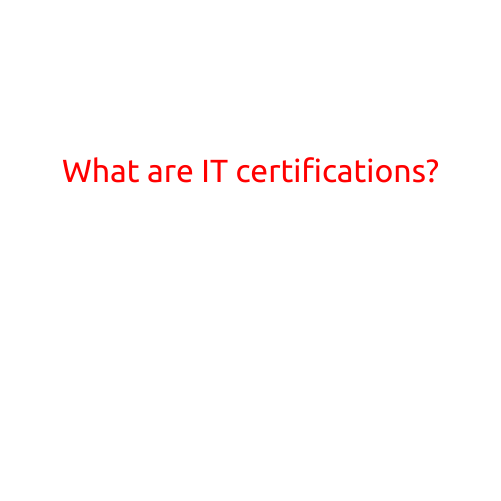
What are IT Certifications?
In today’s rapidly evolving technology landscape, IT certifications have become a crucial aspect of career development for professionals in the Information Technology (IT) industry. These certifications demonstrate a level of expertise, knowledge, and skills in specific areas of IT, making them highly valued by employers and clients alike.
What is an IT certification?
An IT certification is a recognized credential that validates an individual’s proficiency in a particular technology, product, or field within the IT industry. These certifications are offered by various organizations, including professional associations, vendors, and training providers. They can be categorized into three main types:
- Foundation-level certifications: These certifications provide basic knowledge and understanding of a technology or product.
- Professional-level certifications: These certifications demonstrate advanced skills and expertise in a specific area of IT.
- Specialist-level certifications: These certifications demonstrate in-depth knowledge and expertise in a specific technology, product, or field.
Benefits of IT certifications
Obtaining an IT certification can bring numerous benefits to an individual’s career, including:
- Increased earning potential: Certified professionals often command higher salaries and benefits.
- Enhanced job prospects: IT certifications can make you a more competitive job candidate, giving you an edge over non-certified peers.
- Improved job security: Certification demonstrates your commitment to staying current with industry developments and can boost your job security.
- Increased confidence: IT certifications can increase your confidence in your abilities and expertise, leading to better performance and decision-making.
- Access to advanced training and resources: Many certification programs offer additional training and resources to help you stay current with emerging trends and technologies.
Popular IT certifications
Some of the most popular IT certifications include:
- CompTIA A+: An entry-level certification for IT professionals, covering hardware, software, and networking basics.
- Cisco CCNA: A networking certification covering switching, routing, and network security.
- Microsoft MCSA: A certification for Windows operating systems and server administration.
- Oracle OCPJP: A certification for Java programming and development.
- CompTIA Security+: A certification for IT professionals, covering network security, risk management, and data protection.
How to get an IT certification
To obtain an IT certification, follow these steps:
- Choose a certification: Research and select a certification that aligns with your career goals and interests.
- Meet the prerequisites: Check the certification requirements, including education, experience, and training prerequisites.
- Prepare for the exam: Study for the certification exam using official study materials, online courses, or training programs.
- Pass the exam: Take the certification exam and pass with a score that meets the certification requirements.
- Maintain your certification: Many certifications require continuing education and professional development to maintain your certified status.
Conclusion
IT certifications are a valuable way to demonstrate your expertise and commitment to a career in IT. By choosing the right certification, preparing thoroughly, and maintaining your certification, you can enhance your career prospects, boost your confidence, and increase your earning potential. Start your journey to IT certification today and take your career to the next level!





